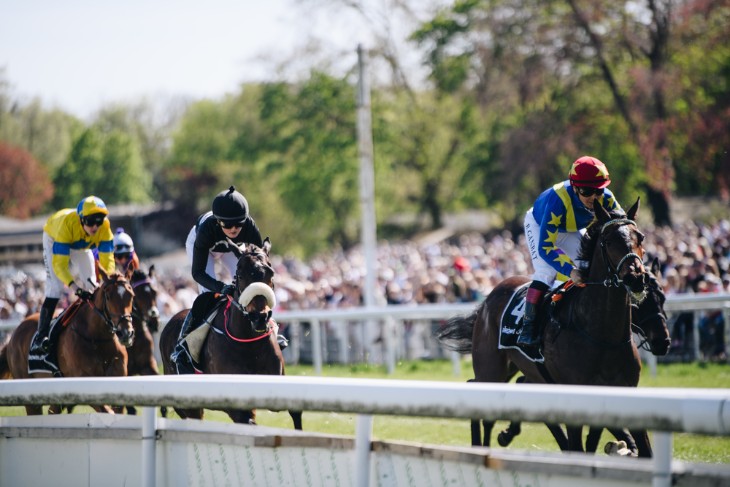- The Roles and Responsibilities of a Jockey
- Paving the Way to Become a Horse Trainer
- The Crucial Role of a Bloodstock Agent
- Exploring the Opportunities in Equine Veterinary Medicine
- Navigating Careers in Racecourse Management and Operations
- Spotlight on Racing Media and Journalism
- Building a Career in Equine Nutrition and Rehabilitation
- Embracing Technology and Data Analysis in Racing
- Marketing and Management in the Racecourse Industry
- The Art and Business of Horse Breeding
Welcome to the thrilling world of horse racing! If you've ever dreamt of turning your passion for these majestic creatures into a rewarding career, you've come to the right place. The horse racing industry offers a plethora of exciting opportunities, from being a skilled jockey guiding a powerful thoroughbred towards victory, to the meticulous work of a bloodstock agent, identifying and acquiring promising equine talent. In this comprehensive guide, we will explore the different career paths within the horse racing industry and provide valuable insights on how to build a successful career in this dynamic field.
The Roles and Responsibilities of a Jockey
Being a jockey is often considered the pinnacle of careers in horse racing, where skilled riders showcase their prowess in the saddle, forging a powerful partnership with their equine partners. These athletes must possess not only physical strength and agility but also an innate understanding of equine behavior.
As a jockey, your responsibilities go beyond just riding the horse during races. You must maintain an optimal weight to ensure the horse carries the right burden and must develop a deep connection with the animals, gauging their mood and temperament. Jockeys also work closely with trainers, discussing race strategies and evaluating the horse's performance in training sessions.
Becoming a successful jockey requires dedication, rigorous training, and an unwavering passion for the sport. Apprenticeships are common routes to kickstart your career, working under experienced jockeys and learning from their expertise. Additionally, getting involved in point-to-point racing or amateur races can provide valuable experience before aiming for a professional career on the racetrack.
Paving the Way to Become a Horse Trainer
Horse trainers are the architects behind a racehorse's success, responsible for nurturing young talent and transforming them into champions. This role demands a deep understanding of equine physiology, psychology, and training techniques.
To embark on the path of becoming a horse trainer, a solid foundation in horsemanship is essential. Many trainers begin their journey by working as stable hands or grooms, gaining hands-on experience with the day-to-day care of horses. From there, aspiring trainers often seek formal education in equine science or pursue apprenticeships under established trainers.
The journey to becoming a successful trainer can be challenging, requiring patience and resilience. As a trainer, you'll need to customize training regimens for individual horses, considering their strengths and weaknesses. Effective communication with owners and jockeys is crucial, as you collaborate to devise race strategies and manage the horse's overall well-being.
A trainer's success is often measured by the performance of their horses on the track. Cultivating a winning reputation can attract more owners and better horses to your stable, thus advancing your career within the industry.

The Crucial Role of a Bloodstock Agent
In the world of horse racing, bloodstock agents play a pivotal role in identifying and acquiring equine talent with the potential for greatness. These skilled professionals act as intermediaries between buyers and sellers, using their expertise to assess pedigree, conformation, and performance data.
A bloodstock agent's journey often begins with a profound love for horses and a keen eye for evaluating their physical attributes. Many start their careers as groomers or working in breeding farms, gaining invaluable insights into the intricacies of equine genetics. This hands-on experience helps them develop a deep understanding of bloodlines and the factors that contribute to a horse's racing potential.
Once established as a bloodstock agent, the job involves attending auctions and sales, meticulously analyzing pedigrees and observing the horses' physical characteristics. Their ability to spot potential champions before they reach their peak often sets the stage for successful careers. Building a strong network within the industry is vital, as they collaborate with trainers and owners to find the perfect match between horse and rider.
The role of a bloodstock agent requires constant research and keeping an ear to the ground for emerging talent. Staying updated on the latest breeding trends and industry developments is essential to make informed decisions that can greatly impact a horse's future racing success.
Exploring the Opportunities in Equine Veterinary Medicine
The well-being of racehorses is of paramount importance, and equine veterinary medicine is a field that ensures the health and soundness of these magnificent animals. Equine veterinarians are entrusted with diagnosing and treating injuries, administering preventive care, and ensuring that racehorses are in peak condition.
Becoming an equine veterinarian is a challenging yet rewarding journey. It involves completing a degree in veterinary medicine with a focus on equine studies. Practical experience is gained through internships and externships at equine hospitals or under experienced equine veterinarians.
Equine veterinarians need to be well-versed in the unique anatomy and physiology of horses. They must be skilled in diagnosing lameness, respiratory issues, and other common conditions that may affect racehorses. Preventive measures, such as vaccination protocols and nutrition plans, are crucial to maintaining the overall health and performance of the horses under their care.
The fast-paced nature of the horse racing industry means that equine veterinarians must be ready to respond to emergencies at any time. They work closely with trainers and stable managers to design training programs that prioritize the well-being of the horses.
A successful career as an equine veterinarian can lead to opportunities within prestigious racing stables or establish private practices catering to racehorse owners. Their expertise ensures that racehorses stay in top shape, reducing the risk of injuries and contributing to the longevity of their racing careers.
Navigating Careers in Racecourse Management and Operations
Behind every successful horse racing event, there's a dedicated team of professionals managing the racecourse and ensuring the smooth conduct of races. Racecourse management and operations encompass a wide range of responsibilities, making it an essential aspect of the horse racing industry.
Racecourse managers oversee the day-to-day operations of the venue, from scheduling race meets and coordinating with racing authorities to maintaining the facilities and ensuring compliance with safety regulations. They need to be highly organized, adept at managing resources efficiently, and possess strong leadership skills to handle a diverse workforce.
On race days, the pressure is on for racecourse managers as they strive to deliver a seamless experience for racegoers and participants alike. Coordinating with hospitality services, security personnel, and emergency response teams is crucial to ensure the safety and enjoyment of everyone present.
For those with a passion for event management and a love for horses, pursuing a career in racecourse management can be highly rewarding. Gaining experience in event planning, hospitality, or sports management can be a stepping stone towards this role. Moreover, networking within the racing industry is vital to grasp the nuances of horse racing and understand the needs of different stakeholders.
Spotlight on Racing Media and Journalism
Beyond the racetrack, a vibrant world of racing media and journalism thrives, keeping racing enthusiasts updated with the latest news, insights, and stories from the horse racing community. This branch of the industry plays a significant role in promoting the sport and engaging a broader audience.
Racing journalists are responsible for reporting on racing events, conducting interviews with key figures in the industry, and offering in-depth analysis on race outcomes and horse performances. Their ability to present captivating stories and convey the excitement of horse racing to readers and viewers is crucial in maintaining interest in the sport.
The rise of digital media has opened up new avenues for racing journalists, with online platforms, podcasts, and social media becoming popular outlets for delivering racing content. Aspiring racing journalists can start by contributing to racing publications, blogs, or local newspapers to build their portfolio and gain experience.
In addition to racing journalists, racing media encompasses photographers and videographers who capture the captivating moments on the racetrack. Their work adds visual appeal to racing coverage, allowing fans to relive thrilling races and cherish the beauty of these magnificent creatures.
As the horse racing industry continues to evolve, so does the realm of racing media and journalism. Embracing multimedia storytelling and staying up-to-date with digital trends are essential for those seeking success in this dynamic and exciting field.

Building a Career in Equine Nutrition and Rehabilitation
Behind every successful racehorse, there is a team of professionals dedicated to their well-being, and equine nutritionists and rehabilitation specialists play a vital role in ensuring peak performance and speedy recovery.
Equine nutritionists work closely with trainers and owners to design tailored diets that meet the specific dietary requirements of each racehorse. Proper nutrition is crucial for the horse's overall health, stamina, and performance on the track. These experts analyze the nutritional content of feeds, assess the horse's condition, and make adjustments to the diet as needed.
In the event of injuries or physical strain, equine rehabilitation specialists step in to facilitate the horse's recovery. They employ various techniques, such as physiotherapy, hydrotherapy, and controlled exercise programs, to aid in the healing process and ensure the horse returns to racing form safely.
To pursue a career in equine nutrition and rehabilitation, a strong background in animal science, equine studies, or veterinary medicine is beneficial. Practical experience, gained through internships or working at equine rehabilitation centers, is highly valuable in understanding the nuances of caring for racehorses.
With a growing emphasis on horse welfare and performance, the demand for skilled equine nutritionists and rehabilitation specialists continues to rise. For those with a passion for science and a desire to make a positive impact on racehorses' lives, this field offers a fulfilling and rewarding career path.
Embracing Technology and Data Analysis in Racing
The horse racing industry has undergone significant technological advancements, revolutionizing how races are conducted and enhancing the overall racing experience. Data analysis and technology play a pivotal role in decision-making, training strategies, and improving the accuracy of race predictions.
Racing professionals are increasingly relying on data-driven insights to optimize race performance. Advanced analytics tools are used to analyze past race data, track performance trends, and assess the impact of various factors on race outcomes. Trainers can use this information to tailor training programs, improving the chances of success for their racehorses.
Additionally, technology has transformed the way races are broadcasted and viewed by fans worldwide. High-definition cameras, drone footage, and virtual reality technologies provide immersive experiences for viewers, making horse racing a thrilling spectacle.
Furthermore, the rise of online betting platforms has created a demand for skilled data analysts who can interpret racing data and provide odds calculations. These analysts use algorithms to estimate race probabilities, enhancing the accuracy of odds offered to punters.
As the horse racing industry continues to integrate technology and data analysis, there is a growing need for professionals with expertise in these fields. Pursuing degrees in data science, computer programming, or statistics can open doors to a range of exciting career opportunities within racing and related industries.
Marketing and Management in the Racecourse Industry
The racecourse industry relies on skilled professionals in marketing and management to attract audiences, generate revenue, and ensure the smooth functioning of race meets. These roles are essential for creating an unforgettable experience for racegoers and maintaining the financial viability of racecourses.
Racecourse marketers are responsible for promoting race events and engaging with the public. They utilize various marketing strategies, including digital advertising, social media campaigns, and partnerships with sponsors to reach a broader audience. Creating enticing race packages, themed events, and family-friendly activities are some of the ways they entice racegoers to the track.
Racecourse managers are the backbone of the venue's operations. They oversee day-to-day activities, manage staff, and coordinate with racing authorities and other stakeholders. On race days, their attention to detail ensures that everything runs smoothly, from crowd management to maintaining the safety and integrity of the races.
A career in racecourse marketing or management demands strong organizational skills, creativity, and a flair for customer service. Graduates in business, marketing, or event management often find their niche in this field. Passion for horse racing and the ability to work under pressure during peak race days are essential attributes for success.
The Art and Business of Horse Breeding
Behind every racehorse's success story lies the art and business of horse breeding. Breeders play a critical role in producing top-quality racehorses by carefully selecting mating pairs to achieve desirable traits and racing potential.
Horse breeding is a delicate balance of science and intuition. Breeders analyze pedigrees, conformation, and performance records of potential mating pairs to predict the resulting foal's attributes. They aim to enhance strengths and mitigate weaknesses, hoping to produce a champion on the racetrack.
Breeding farms are the breeding grounds for future racehorse stars. These farms provide expert care for pregnant mares and young foals, ensuring their health and well-being during the crucial early stages of development.
The business side of horse breeding involves making strategic decisions on which stallions and mares to breed, considering market demand, potential returns, and the breeding industry's current trends.
Becoming a successful breeder requires a deep passion for horses and a profound understanding of equine genetics and bloodlines. Many breeders inherit their knowledge from generations of family involvement in the industry, while others pursue equine science degrees or apprenticeships under experienced breeders.
The horse racing industry is a tapestry woven from various threads of passion, expertise, and dedication. From jockeys guiding their steeds to victory to racecourse managers orchestrating memorable events, each role contributes to the vibrant and captivating world of horse racing. Whether you aspire to ride alongside thundering hooves, shape equine champions through breeding, or work behind the scenes to ensure the industry's smooth functioning, the horse racing industry has a place for individuals driven by their love for horses and the thrill of the sport.
We hope this guide has shed light on the diverse career paths within the horse racing industry and provided valuable insights into how to build a successful and fulfilling career in this exciting realm. So, whether you're galloping towards becoming a jockey, managing racecourse operations, or immersing yourself in the art and science of horse breeding, seize the reins of your dreams and embark on an incredible journey into the world of horse racing!







